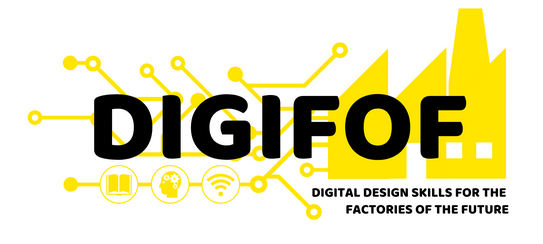Short term impact
On HEIs and training institutions:
- Modernization of teaching infrastructure (OMiLAB4FoF and open design tools)
- Modernization of teaching concepts (problem-based learning) as well as access to industry cases
- New cooperation and knowledge exchange opportunities with industry
- Increased knowledge of international (project) collaborations
On students:Â Â Â Â
- Better self-directed learning abilities
- Abilities of interdisciplinary team-based learning
- Knowledge of different topics relevant for FoF
- Skills in applying design tools in a design lab in order to solve open ended problems
On professionals
- Better promotion opportunities due to DIGIFOF vocational trainings
- Better problem-solving abilities on the job due to a new topical knowledge as well as skills on applying design tools
- Better digital visibility of competences due to the Open Badge
On enterprises
- Access to FoF-related knowledge, tools and methods
- Opportunity to access new innovative approaches and ideas in solving business relevant problems
- Opportunity to attract high potential students due to new industry-academia cooperation
On multiplier organizations
- Access to innovative knowledge to distribute to its members
- Access to new cooperation opportunities
Long term impact
On HEIs and training institutions:
- Increased attractiveness for students due to modern and job relevant programs
- Increased visibility and ranking in international lists due to publications, projects and cooperation
- Increased opportunities for national and European academic and industry cooperation including (research) projects
On students:Â Â Â Â
- Good employment opportunities (locally as well as internationally) due to competences acquired
On professionals
- Better employment opportunities due to formal certifications of competences
On enterprises
- Better market positioning and increased competitiveness due to digital transformation processes triggered
- Better and more qualified services/products/processes due to qualified staff
On multiplier organizations
- Increased attractiveness for new member, projects and cooperation
On wider public
- Innovative approaches used in the region thus fostering social- and economic well-being
Â
The desired impact of the project on a specialist level, both for students and professionals, is to innovate education topics and tools, more exactly the part related to Factory of the Future by using more modern approaches towards interdisciplinary education and use of open ICT-tools and materials. This impact is relevant both at local, European and international level given today’s mobility of workforce and globalized working environments. This is considered to be especially important as the topic of Factory of the Future is expected to yield highly qualified jobs in the future European economy, which produce high added value both in economical but also in social terms.
